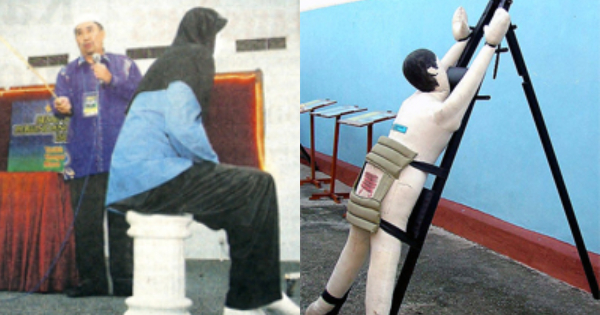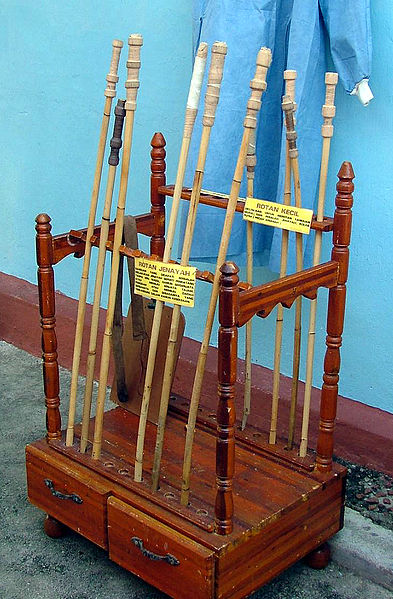4 Things You Should Know About Syariah Caning In Malaysia
Despite restrictions in the civil law, women are allowed to be caned under Malaysia's Syariah law.
Two Terengganu women were publicly caned in front of 100 people yesterday, 3 September, for attempting to have sex in a car
About 100 people including members of the public, government agency representatives, and members of the non-governmental organisations witnessed the caning in a court room at the Kuala Terengganu Syariah High Court yesterday.
The women were the first in Terengganu to be publicly caned under the Syariah law.
The caning has sparked widespread outcry from multiple non-governmental organisations (NGOs)
The public punishment of the women have been slammed as "a travesty and a grave miscarriage of justice".
Women's rights groups Justice for Sisters and Sisters in Islam argued against the caning, claiming that it can only be carried out against prisoners as stipulated in the Prison Act 1995 and the Prisons Regulations 2000.
Furthermore, The Star reported the NGOs as noting that laws regarding the caning of women in Malaysia have been "inconsistent".
"Inconsistencies create confusion in the jurisdiction of the Prison Department thus directly affecting the rights of women in Malaysia protected by Article 8(2) of the Federal Constitution against gender discrimination," the NGOs added.
Meanwhile, minister in the Prime Minister's Department Dr. Mujahid Yusof Rawa called for a review of the public nature of caning under Syariah law
"It (the provision) must be looked into, whether the (general) public can be present. The two or three officials present can be considered as the public," Mujahid was quoted as saying by The Malaysian Insight yesterday.
Nonetheless, he reiterated his belief that everything in the women's case was done according to the law.
While Malaysia is no stranger to caning as a form of corporal punishment, the legality of caning the Terengganu women publicly is being heavily debated.
1. It is one of the three types of caning in Malaysia
Caning is legalised as a form of corporal punishment in Malaysia. There are three types:
- Judicial or prison caning,
- School or courtroom caning,
- and Syariah caning.
Judicial canings are applicable to male adults, courtroom canings apply to males under the age of 21, while both Muslim men and women are subjected to Syariah caning.
2. The physical pain caused by Syariah caning is much less severe than judicial caning
(From left) A demonstration of Syariah caning in 2009, and a mannequin display of judicial caning.
Image via The Nut GraphWhile the rattan used in judicial canings are heavy and long, it is stipulated in the Prisons Regulations 2000 that the rattan used in courtroom or Syariah canings should be a metre in length, and light.
Harian Metro reported that the Syariah canings have to be conducted with "moderate" force in order to not break the skin of offenders.
Rattans in the front row are used for judicial canings, while the ones in the back row are for courtroom and Syariah canings.
Image via Prison Department MalaysiaJudicial canings are also administered to the bare posterior and often break the skin, while Syariah canings are meant to be "symbolic".
In 2010, The Star reported then Home Minister Datuk Seri Hishammuddin Hussein as saying that the three Muslim women who were caned in the Federal Territory Syariah High Court for having illicit sex did not suffer from any cuts or bruises following the punishment.
Here's a video of a Malaysian Syariah caning conducted in 2016:
3. Under the civil law, caning cannot be carried out against women
Section 289 of the Criminal Procedure Code prohibits caning on a few groups of people:
- Women,
- Men sentenced to death,
- And men above the age of 50 except those convicted of rape under the Penal Code.
Furthermore, under the Prison Act 1995 and Prisons Regulations 2000, caning can only be carried out against prisoners. The Terengganu women were not sentenced to jail, but instead slapped with a fine and six lashes of the cane.
4. Caning in Malaysia had always been conducted away from the public eye
According to the World Corporal Punishment Research, judicial and Syariah canings in Malaysia have always been performed privately in prison. Courtroom canings, however, are administered in the presence of the offenders' parents, officials, journalists and other offenders.
Hence, the Terengganu women's punishment was the first-ever case in Malaysia to have been witnessed by a crowd as huge as 100 people.
Despite international condemnation of the women's public caning, it does not seem like the practice is going away anytime soon
Malay Mail reported earlier today, 4 September, that a Member of Parliament (MP) from the Malaysian Islamic Party (PAS) Datuk Khairuddin Aman Razali applauded the public caning of the Terengganu women, before adding that the punishment will "invite Allah's blessings" to the state and its people.
Moreover, Bernama reported Pahang Islamic Religious Department Datuk Mohamad Noor Abdul Rani as saying today that the punishment of public caning is "in review", signalling that Pahang may be the next state to implement it after Terengganu.



